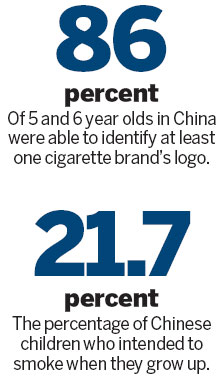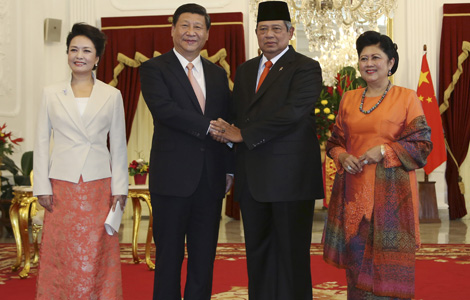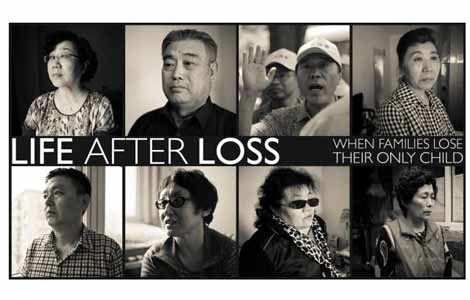Smoking: Chinese tots say they will 'light up' when they grow up
Updated: 2013-10-03 11:05
By Chris Davis in New York (China Daily)
|
||||||||
More than one out of five Chinese children aged 5 to 6 say they intend to smoke when they grow up.
That is one of the key findings of a study from Johns Hopkins Bloomberg School of Public Health published in this month's Pediatrics. Researchers looked at the age group's recognition of cigarette brands' logos and labels in six low- to middle-income countries (Brazil, China, India, Nigeria, Pakistan and Russia).
Overall, 68 percent of 5 and 6 year olds were able to indentify at least one cigarette brand's logo, ranging from 50 percent in Russia to 86 percent in China, according to the study.
"The results from China were the most troubling compared to the other countries that we included," said study co-author Joanna E. Cohen in an interview. "More than eight of every ten 5 and 6 year olds that were included in this study could recognize at least one cigarette brand, which is incredible."
In China, the study says, 53 percent of all men and 2 percent of all women smoke, but the children's recognition factor wasn't just from seeing packages in the home. The study suggests that Chinese children are "getting messages about these brands in their environment - billboards, magazines, stores, etc. So it's extremely troubling", Cohen said.
Although many factors lead to tobacco use, the report explains, previous studies have found clear linkages between "exposure to, interest in, and positive attitudes about pro-tobacco marketing and media messages are associated with increased odds of youth liking smoking, early initiation and increased use".
According to industry trends cited in the study, big tobacco companies have been retargeting their promotion campaigns away from "high-income, industrialized countries" and are zeroing in on low- to middle-income countries (LMICs), where "weak tobacco control policies and/or poor enforcement" together with a strong tobacco industry presence help keep smoking levels high.

In LMICs, the study says, "tobacco companies have made great efforts to encourage uptake of their products. Of particular concern was the sample from China".
The study was conducted by personal interviews with the children in the six LMICs that have the highest number of adult smokers. In each country, one rural and one urban area were selected. The researchers said they made every effort to measure "typical" children, "not those from more wealthy, cosmopolitan communities ("where awareness of tobacco marketing would presumably be higher").
In China, urban data was collected in 2012 in the center of Qixian county and rural data in Jialing town of Qixian county schools with parental permission and participation and in the local language or dialect. Children were given "yes" and "no" cards to point to and, along with questions like "Do you think you will drive a car when you grow up?" were asked "Do you think you will smoke cigarettes?" The children played a matching game to assess their familiarity of brand logos.
Chinese children ranked highest in use of tobacco by either a parent (65.3 percent) or household member (70 percent). By contrast, only 1.6 percent of Nigerian children had a parent who smoked and 18.6 percent of Brazilian kids had a household member who lit up.
Chinese children also topped the charts in their ability to identify at least one cigarette brand at 85.9 percent, followed by Pakistan at 84 percent, India 75.9 percent and Brazil 59.3 percent.
In the category of intention to smoke when they grow up, only India's children, at 30.2 percent, topped Chinese children's 21.7 percent. In contrast, Nigeria was at 10 percent, Brazil 8 percent, Pakistan 5.3 percent and Russia 3.5 percent.
"Interestingly, there were no significant differences between Indian boys and girls," the authors write. "Gender, however, was significantly associated with smoking intentions in China where boys were more likely than girls to say they would smoke later in life."
The study says that despite official limitations on advertising in the countries studied, young children were still being exposed to cigarette marketing campaigns. "Tobacco companies are using creative approaches to attract new smokers and retain existing smokers", the study found.
The study's authors suggest more "rigorous approaches" be used in these countries to start snuffing out smoking, including removing logos and using plain packaging, relocating retailers and changing on-screen pro-smoking media.
The study shows consistently "high brand awareness among children aged 5 and 6 years" and says that should be "a clarion call to significantly restrict tobacco advertising, promotion and sponsorship, especially in low- to middle-income countries" where smoking rates are highest.
"I know that China is interested in talking about, considering strengthening their tobacco interventions, including putting more restrictions on tobacco advertising, promotion and sponsorship and I would hope the findings from this study would really help to push that along," Cohen said. "If so many children that young are able to identify cigarette brands, it does not bode well for the future of this generation."
chrisdavis@chinadailyusa.com
(China Daily USA 10/03/2013 page2)

 Xi pledges to boost ties with Indonesia
Xi pledges to boost ties with Indonesia
 Little room for growth among high-end hotels
Little room for growth among high-end hotels
 Diplomatic game
Diplomatic game
 The first place to be called the 'Middle Kingdom'
The first place to be called the 'Middle Kingdom'
 Lavish wedding ebbs under luxury ban
Lavish wedding ebbs under luxury ban
 Travel becomes passport to a new look
Travel becomes passport to a new look
 Impasse in Congress shuts down services
Impasse in Congress shuts down services
 Li, Serena cruise on, Venus out at China Open
Li, Serena cruise on, Venus out at China Open
Most Viewed
Editor's Picks

|

|

|

|

|

|
Today's Top News
Obama, congressional leaders still deadlocked
Xi to address Indonesia's parliament
Russian embassy in Tripoli attacked
Iran has proposal for nuclear deal
The luxury of travel
US novelist Tom Clancy dies at 66
China, Indonesia renew currency swap deal
Obama cuts short Asia trip
US Weekly

|

|





